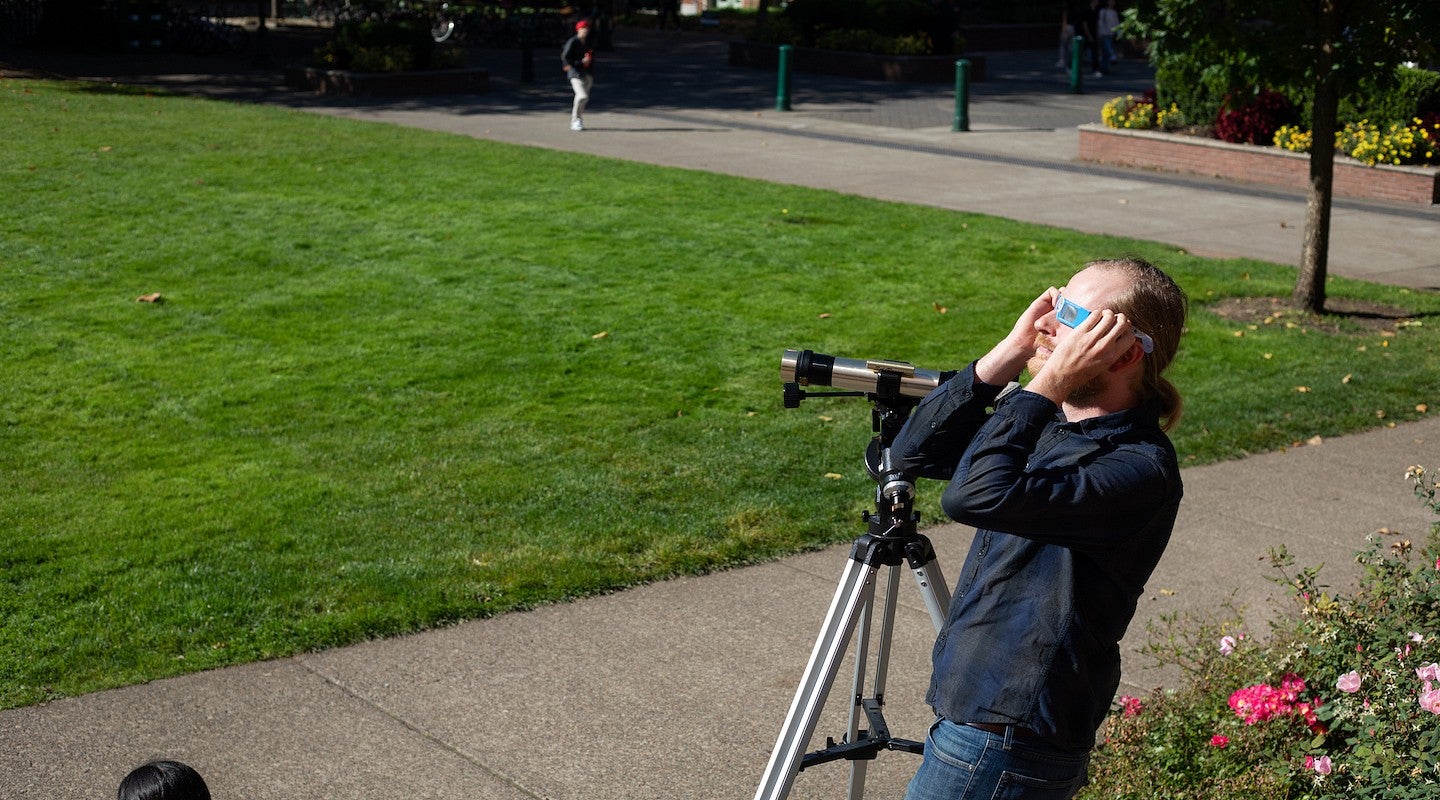
Exploring the cosmos
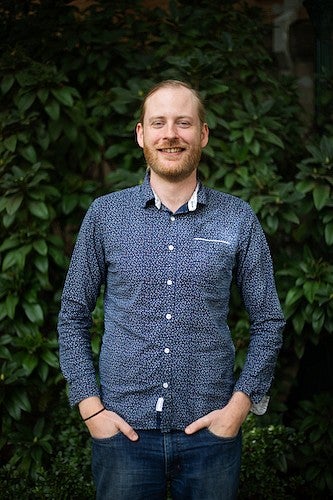
Favorite album of all time: “Sgt. Pepper’s Lonely Hearts Club Band” by The Beatles
Favorite hike in Oregon: Sweet Creek Falls Trail or Cape Lookout
Book recommendation: “The Ringmaster’s Daughter” by Jostein Gaarter
Currently collecting: Rubber ducks. A welcome gift in my office.
Most exciting thing about the CHC: The passionate students and the opportunity to be creative with new curriculum for my classes.
Jesse Feddersen remembers the feeling he got the first time he looked at Saturn through the lens of a telescope. It was a cheaper model that was given to him as a Christmas present when he was in high school.
“It’s kind of a classic origin story,” he recalls. He was struck by the “awe-inspiring nature of looking through a telescope” and seeing the rings around the distant planet. It was in that instant that he started fantasizing about another world far from Earth.
“I grew up in the woods, out of town, so it’s a pretty nice night sky,” Feddersen recalls. “You can see the Milky Way clear at night, which is not the case in a lot of places anymore.” As a youth, Feddersen spent lots of time exploring the woodlands outside of his hometown of Bloomington, Indiana. He credits the way he was raised for fostering his sense of curiosity.
“Our parents would always take us out and we would go birdwatching or look at the stars — I remember watching meteor showers in my backyard,” he says.
He spent his days flipping over rocks and digging up salamanders when he wasn’t looking at the night sky. “I think that’s what definitely got me interested in science and then exploration — astronomy always seemed like a very exploration-focused field,” he says now.
For Feddersen, the cosmos offers an unlimited supply of information and a promise of exploration. Like him, many astronomers can identify the moment they became fascinated with the vastness and the beauty of space.
Since that moment in high school, he’s been helping pass that fascination on to others. As one of the new core faculty members at the Clark Honors College, Feddersen is teaching students in the natural sciences.
“None of (space) is tangible,” says Feddersen, who studied astronomy and physics at Indiana and Yale universities. “Part of making that tangible is through connecting to people,” he says.
Born in 1991, he is the second youngest of four kids in the family. He remembers sharing his love of space with his older siblings, who both pursued careers of exploration in their own regard. His sister, in addition to being a fiddle player, works in architecture. His brother currently lectures at the University of Hamburg in Germany.
Feddersen credits his mother, who was a science teacher herself, for how she raised her children. “She always really fostered our curiosity,” he says.
Building a bridge to the stars
He was involved with Indiana University's astronomy program long before he attended as an undergraduate. “I think the first memory I have in terms of space was the (NASA) Spirit and Opportunity rovers that went to Mars,” Feddersen says. The twin rovers landed on Mars in January 2004 when he was 13.
He remembers sitting in a lecture hall that day at the university and watching all the excited reactions from the NASA scientists on the screen, as well as the attendees watching the event. “That was my first sort of inkling of space exploration and astronomy-related things,” he says. “It felt cool to be in a grown-up space as a kid.”
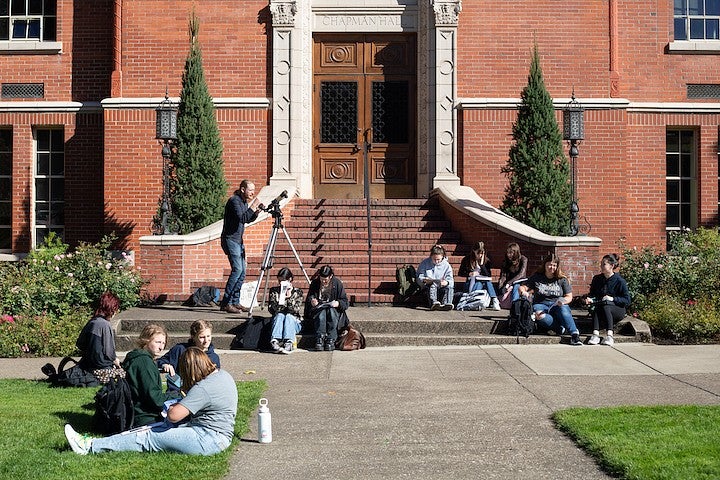
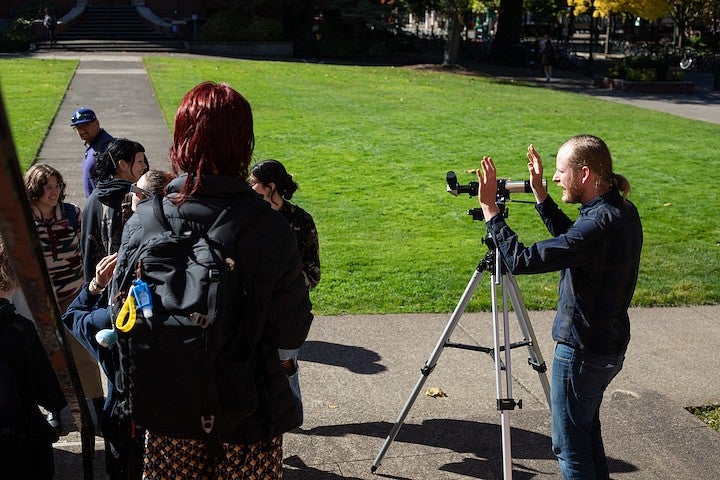
Feddersen wants his students to experience the feeling of wonder and awe that comes from looking into the cosmos through a telescope.
He decided to attend the university because he had already developed connections with the astronomy department. When Feddersen wasn’t studying, he was constantly involved in outreach, finding ways to engage the public with astronomy.
He joined the astronomy club and set up telescopes on the sidewalk, encouraging passersby to take a look at the sky above. With an outgoing personality, he’d yell to people across the street to encourage them to come over and check out his telescope.
“That was one of my favorite things that I did in college, really,” he says, “It really started me on my love for teaching and explaining, and also giving an opportunity to people who don’t have it otherwise or wouldn’t seek it out.”
In graduate school at Yale, he continued his studies and gave several presentations to the public at the university’s Leitner Family Observatory and Planetarium. He recalls helping folks learn how to use telescopes and also setting up a podcast about the connection between science and art.
“In grad school, I was starting to become more interested in things that affect people, and astronomy is very removed and abstract,” he says. “I felt that I got that joy and understanding through teaching.”
Exploring the universe of teaching
After graduating from Yale in 2019, Feddersen wasn’t sure what his next step would be. He recalls many of his colleagues applying to post-doctoral programs and professional research positions, but he didn’t make that jump right away. “I sort of lost a little bit of interest in personally being involved with research and was more interested in teaching,” he says. “I was looking forward to taking some time to figure out what it was I wanted next.”
He booked a one-way ticket to Europe and set out to visit several different countries. “Turkey is where I had ended up for a while, and then everyone started talking about a virus,” he says.
As the pandemic spread, he returned to Bloomington and began to look for a job. “I started applying online and looked for anything that I seemed to be qualified for, mostly teaching jobs,” he says. The one that seemed to stick was an open position at the University of Wyoming as a lecturer, replacing a professor who was on leave.
He started remotely, teaching classes from his childhood bedroom before he moved to Laramie, Wyoming a few months into the position. “I figured maybe I would just do it for a year and see what would happen next,” he says, “but then that person left permanently.”
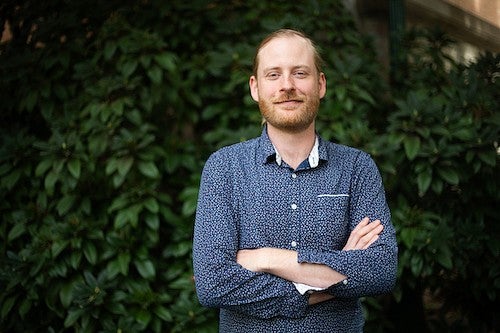
Earlier this year, he discovered the posting for a position at the CHC. He and his partner were searching for places where they could move and both get jobs. His partner, Paris Franklin, is now working as an archaeologist at the Museum of Natural and Cultural History, and Feddersen landed at the CHC.
Today, Feddersen is teaching “Syzygy: The History and Science of Eclipse,” along with a beginning thesis class. He is also slated to teach a course later in the academic year called “Black Holes: From Fiction to Fact.”
“I definitely love the challenge of trying to get some of these big concepts across,” he says. “I’m really excited for the creative, eclectic bunch of students at the Honors College. I’m excited to see what they do.”
A nature enthusiast, he plans to get outside as much as he can. As he sets up his office, he has committed to making his first telescope from high school a permanent fixture there. “I’ll definitely be using it in my classes,” he says.
